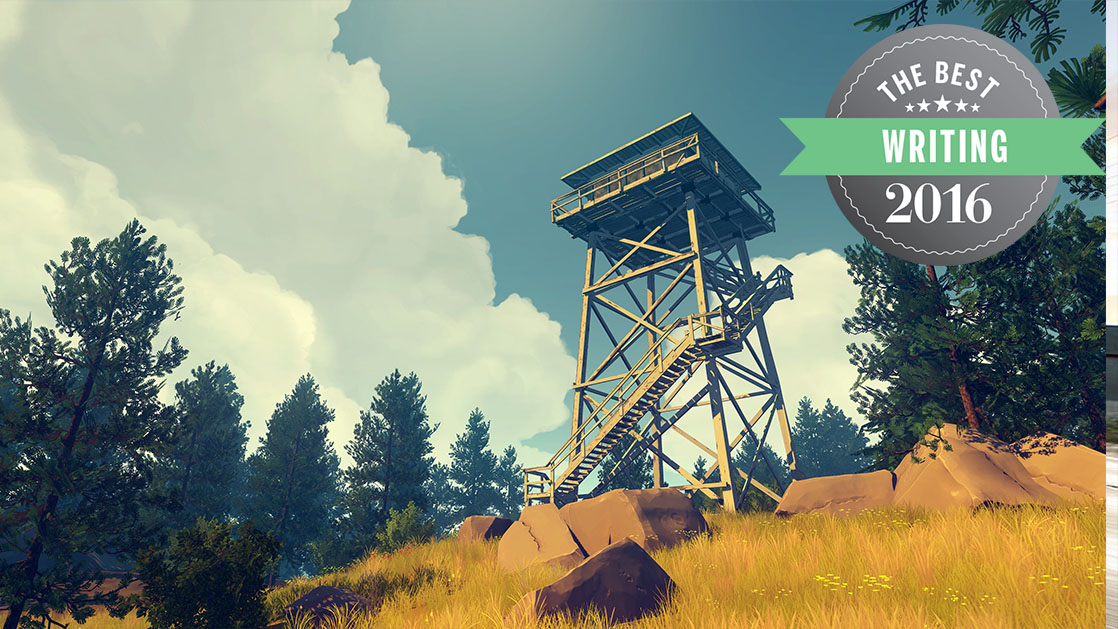
We loved the warm writing in Firewatch so much we had to give it an award. Our games of the year are chosen by the staff through voting and debate, with commentary written by its biggest proponents. We'll be posting the rest of our awards and personal picks daily as we approach the end of the year, and you can see all of the awards so far here.
Chris Livingston: Typically, I’m not a great listener when I’m playing games. I managed to save the world in both Oblivion and Skyrim without ever letting an NPC complete an entire sentence. When forced to listen to NPCs rambling on with important information, I’ll jump around, climb on furniture, throw objects around—anything to pass the time besides simply standing in place. And listening to someone talk via radio while I’m trying to enjoy myself is both an incredibly common feature of games and one of my biggest pet peeves. Can I hold a button down to skip a cutscene, or tap a space bar to get someone to shut the hell up? If so, I’m thrilled, and if not, I’m annoyed. Rarely does a game come along where I want to stand there simply listening to people talk, and almost never do I find myself wishing the characters in a game would talk even more than they already do. It happened in the Mass Effect games—nothing excited me more than returning from a mission to find fresh dialogue options available—and it happened in Firewatch.
I can’t recall a game that so quickly had me invested in the story and characters. There’s the gut-punch of the opening choices you make to set the stage, brilliantly presented as a series of simple text-based prompts that still manage to be emotionally powerful. This leads to wonderfully written dialogue between the game’s two main characters, bolstered by the fantastic voice performances—I would go so far as to say the best in a game, ever—by actors Rich Sommer and Cissy Jones.
I stalked glumly through the park, angry with myself, not even wanting to play if she wasn’t going to talk to me, but not wanting to stop playing in case she called back.
Keeping the characters restricted to only communicating via radio was perhaps done out of practicality—Campo Santo isn’t a huge studio, and introducing a fully animated NPC into an open world surely adds tons of extra work and all sorts of logistical challenges—but it’s perfect for Firewatch. It makes the players rely on their imaginations when it comes to Delilah, a more powerful tool than any mo-cap rig can muster, and as the guy who never listens I found myself hanging on her every word. At one point in the game I pissed her off with one of my dialogue choices, and she stopped talking to me for a while. It made me truly miserable to be suddenly cut off from her, and I felt real regret in what I’d said and wished I could take my words back. With her silence stinging, I stalked glumly through the park, angry with myself, not even wanting to play if she wasn’t going to talk to me, but not wanting to stop playing in case she called back. That’s the power of words, when they’re thoughtfully written and skillfully performed.
Though the plot itself eventually wanders into fairly ridiculous territory, the realistic and believable relationship created by the writers and performers remains strong throughout, full of humor, longing, regret, and sexual tension.
Samuel Roberts: I loved exploring Firewatch's hot Wyoming wilderness, but it's the performances and writing that really made this worth talking about this year. Probably the most mature depiction of a relationship I've seen in a game.
Tony Ellis: As well as artfully recreating the beauty of America’s national woodland on screen, this game also creates a world in your head. It’s a more nebulous but equally fascinating and changing landscape, woven out of Henry’s evolving relationship with someone who exists only as a crackling voice on his walkie-talkie, and their shared, increasingly paranoid conspiracy theories. While the story ends in a pretty silly place, as Chris notes, the way this internal terrain maps onto the beautiful Wyoming wilderness as you play makes for a unique and remarkable game.
Keep up to date with the most important stories and the best deals, as picked by the PC Gamer team.
Tim: Sometimes, when I’m editing our Canadian news writer Andy Chalk, who I’ve never met in real life, I like to pretend we’re like Henry and Delilah, only communicating via Slack rather than shortwave radio. There’s a powerful pull to the idea of two lost souls, not quite knowing each other, bonding against a backdrop of some potential crisis. In Firewatch’s case, a sinister conspiracy—or is it!—and in Andy and mine’s, another delay to some Ubisoft sequel to write up. Still, however classic the scenario is, what brings it to life in Firewatch is the warmth and humanity of the writing, which linger in the memory long after the ending fades. Also: I’ve heard a lot of people grouse about the ending, but the low key lack of resolution felt just about perfect to me. Or at least it certainly felt like real life.
For more on Firewatch, read our full review, check out the game's lovely trees, and discover some of the other best short games you can play on PC.
The collective PC Gamer editorial team worked together to write this article. PC Gamer is the global authority on PC games—starting in 1993 with the magazine, and then in 2010 with this website you're currently reading. We have writers across the US, UK and Australia, who you can read about here.


